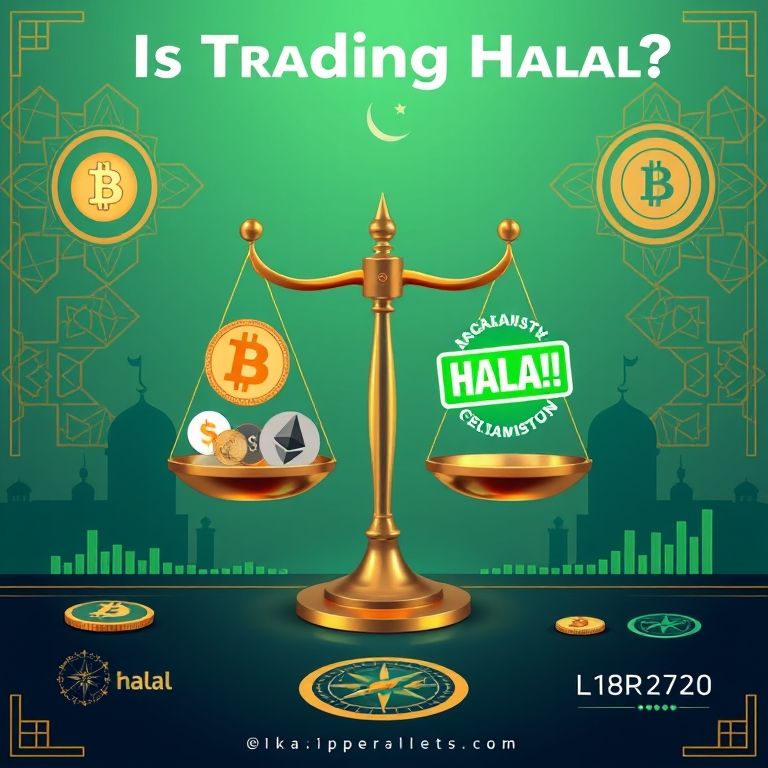is trading crypto halal
Is Trading Crypto Halal?
Introduction
For many Muslim traders, the question isn’t just about potential profits—it’s about alignment with faith. Is trading crypto halal? The answer isn’t a simple yes or no; it hinges on how you screen assets, approach leverage, and use technology. This piece dives into practical considerations, real‑world scenarios, and the evolving Web3 landscape so you can trade with transparency, risk awareness, and a halal‑by‑design mindset.

What Halal Means for Crypto
Key point: halal isn’t a blanket label on a technology; it’s about intent, structure, and risk. In crypto, scholars emphasize avoiding riba (interest), excessive gharar (uncertainty), and deception. A halal approach starts with choosing transparent projects, clear terms, and compliant platforms. Think about loans with fixed returns on a lending protocol that publishes audits and governance rules, or tokenized assets backed by real value rather than usurious debt. The aim is to trade in a way that preserves fair dealing, disclosures, and verifiable risk.
The Compliance Landscape: Sharia and Web3
There’s no single global ruling, but the trend is moving toward pragmatic screening rather than blanket bans. Some scholars accept crypto as a medium of exchange if used for legitimate commerce and transparent economics. Others stress caution with highly leveraged products or speculative schemes. In practice, many halal-minded traders adopt due diligence: selecting exchanges with robust KYC, transparent fee structures, and clear risk disclosures; using halal‑certified screening tools for assets; and avoiding tokens tied to unsustainable promises or interest-like yield mechanisms. The bottom line: you can stay within halal guidelines by choosing assets and platforms that emphasize real utility, transparency, and fair dealing.
Asset Classes and Diversification: Why Crypto Fits (and When Not)
- Diversification advantages: a mix of forex, stocks, crypto, indices, options, and commodities can reduce correlation risk and provide hedging opportunities. In a halal framework, you’re looking for assets with clear, legitimate value drivers and transparent pricing.
- Crypto as a liquid, 24/7 market can complement traditional assets, enabling remittance, cross-border payments, and programmable contracts. But volatility is real—this isn’t a get‑rich‑quick arena, and halal compliance rests on avoiding schemes built on debt and speculation.
- Practical approach: use halal screening for derivative exposure, prefer non‑interest‑bearing income streams, and focus on assets with verifiable cash flows or real‑world use cases.
Security, Tech, and Charting Tools
- Go secure: hardware wallets, multi‑signature wallets, and audited smart contracts reduce counterparty risk. Pair this with reputable charting tools and risk dashboards to monitor price action, liquidity, and protocol health.
- DeFi has grown, but so have rug pulls and flash loan exploits. Halal traders emphasize governance transparency, audited contracts, and a clear path to exit if risks surge. Chart patterns, on-chain analytics, and stop‑loss discipline help keep decisions grounded.
Leverage, Risk, and Reliability
- Leverage can magnify gains and losses. A halal approach ki1.s focus on risk tolerance, position sizing, and conservative leverage, never exceeding personal comfort and regulatory constraints. Practical tips: limit exposure per trade to a small percentage of capital, use fixed stop losses, and diversify across uncorrelated assets. Prefer platforms with clear margin rules, real-time adverse event alerts, and independent risk controls.
DeFi: Development, Challenges, and Realities
- Decentralized finance promises open access and programmatic trust, but it faces regulatory scrutiny, liquidity fragmentation, and security gaps. For halal traders, the challenge is ensuring that protocols align with ethical financing principles and offer verifiable risk disclosures. Layer‑2 solutions and cross‑chain bridges improve efficiency, yet demand rigorous security audits and governance clarity.
Future Trends: Smart Contracts and AI-Driven Trading
- Smart contracts will automate halal compliance checks, escrow terms, and transparent settlement, reducing mispricing and hidden risk.
- AI can enhance risk scoring, pattern recognition, and automated screening against Sharia screens. However, AI also brings new risks—data bias, model opacity, and overfitting. The smart path is to combine human oversight with AI insights, maintaining clear compliance guardrails.
- Slogan to reflect future readiness: “Trade with faith, ride the tech—with transparent rules and Halal‑by‑design contracts.”
Closing thoughts
Is trading crypto halal? The answer lies in method, not a label. Build your practice around transparency, risk discipline, and credible screening. Embrace advanced tech, secure infrastructure, and prudent exposure across assets to unlock the Web3 opportunity without compromising your values. For the faithful, it’s not about avoiding crypto; it’s about trading it in a way that honors trust, clarity, and responsible growth. Trade with integrity, trade halal‑aligned, and let the crypto journey unfold with confidence.